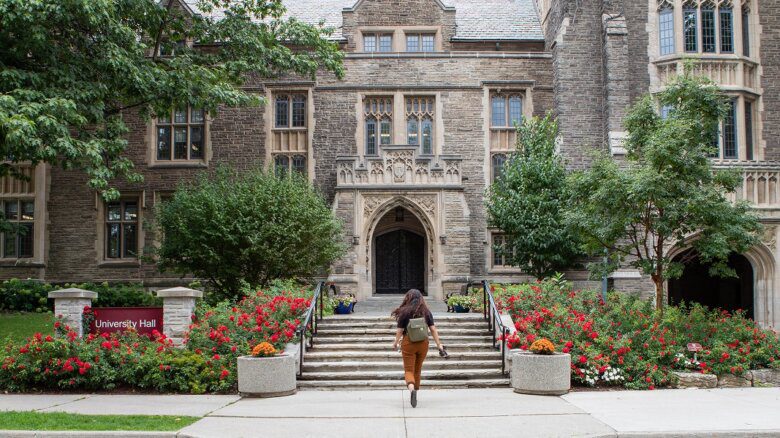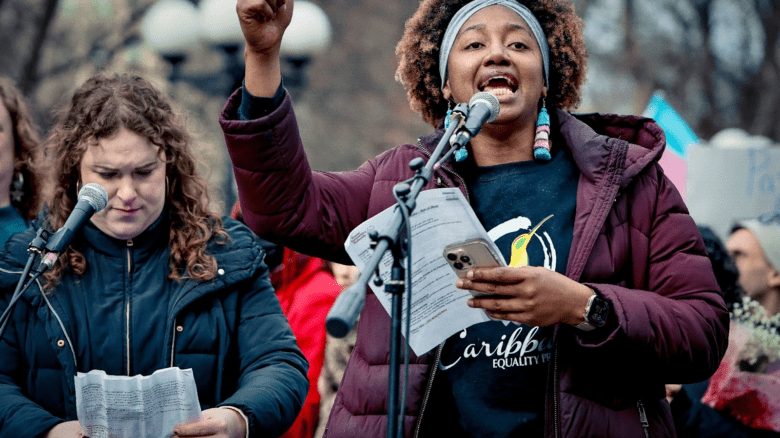When Will Larkins learned that Stonewall wouldn’t be among the historical events taught in their history class, they knew it was time to take matters into their own hands.
Larkins, a junior at Winter Park High School in the suburbs of Orlando, Florida, presented a mini-lesson on the watershed moment in queer history on March 31 after receiving permission from their history teacher. A short video of the presentation shows them giving a lecture to the class in a sleeveless red dress and pearls, explaining the events that led to demonstrations against police brutality at New York City’s famed Stonewall Inn in June 1969.
“Essentially, people were fed up with the abuse,” Larkins said in the video. “And Stonewall was the tipping point.”
“LGBTQ American history is not taught in Florida’s public schools, so I took it upon myself to explain the events of the Stonewall Uprising.”
Larkins posted the video to Twitter, noting that the lack of LGBTQ2S+ education in Florida schools will likely only worsen with the recent passage of the state’s “Don’t Say Gay” bill, which severely limits discussions surrounding sexual orientation and gender identity in Florida classrooms. Although the bill specifically targets K-3 curricula, critics have claimed its broad language could potentially apply to any grade.
“LGBTQ American history is not taught in Florida’s public schools, so I took it upon myself to explain the events of the Stonewall Uprising to my 4th period US history class,” Larkins wrote.
Within hours, Larkins’ post had accumulated thousands of likes, retweets and replies. Teachers, parents and students from across the United States expressed appreciation and solidarity, noting the importance of education about LGBTQ2S+ history, particularly in the face of legislation like the “Don’t Say Gay” bill. Nearly a dozen U.S. states have introduced similar bills during the 2022 legislative session, most recently Alabama and Ohio.
For their part, Larkins is grateful for the opportunity to raise awareness. “A lot of teachers wouldn’t have let you do that,” Larkins tells Xtra. “It was cool.”
But along with the positive feedback came a barrage of hate: right-wing trolls called them a “groomer” and a “freak,” and some even criticized the way they were dressed in the video. Unfortunately, Larkins says they are accustomed to these kinds of reactions. They’re extremely visible at school as president of its queer student group and organized a March 7 walkout on campus that was attended by over 500 of their classmates.
“The kinds of responses and comments that I was getting to that tweet really reflect a lot of things that I’ve been told and I’ve heard about myself: that I’m just dressing like this for attention or even just the blatant homophobia,” they say. “All of that I have heard at school.”
Larkins says that they’ve had slurs yelled at them in the hallways of Winter Park High School, and flyers for the school’s queer student group are regularly torn down. Despite the recent surge in support following the campus walkouts, homophobia on campus remains persistent. A video of a fellow student stealing and stomping on a Pride flag at the walkout went viral on TikTok shortly after it was filmed.
Despite the fact that the video of the incident was posted by several students, Larkins says they were the only person subjected to a disciplinary investigation by school officials, for allegedly cyberbullying the student in question. (Xtra reached out to the school for comment but did not receive a reply as of publication time.)
Larkins also says the administration’s response to their Stonewall presentation has been less than supportive. Despite the fact that they had full permission from their teacher to give the presentation, they were transferred into a different history class after the video went viral. When outlets like the Washington Post and The Advocate published stories about the video, Larkins says the student who they asked to film the lecture also received a disciplinary referral from the school.
The administrative shuffle mostly just confuses Larkins. “All of this really plays into a larger issue of adults not really respecting the youth’s voices,” they say. “I do have allyship within my administration, and things have gotten better throughout the year. But even now, it’s like: Why am I being punished?”
But whether the opposition is coming from anonymous internet trolls or their own school’s administration, Larkins remains determined to fight for LGBTQ2S+ students. In addition to their on-campus activism, they recently helped lead a voter registration drive that registered 200 people to vote, and spoke out against the “Don’t Say Gay” bill in testimony to Florida state Senate earlier this year.
Larkins hopes to leverage their newfound platform to raise awareness about this year’s anti-LGBTQ2S+ legislative crusade in the U.S. and persuade more people to take action. “We can protest as much as we want, but nothing’s going to get changed unless we have some less corrupt people in power,” they say.


 Why you can trust Xtra
Why you can trust Xtra


